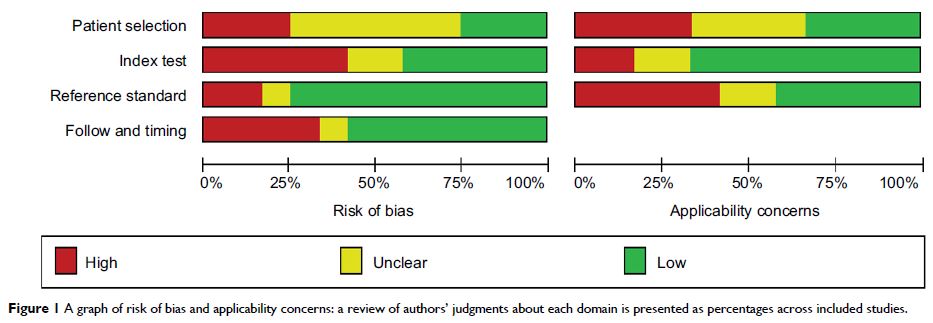9 0 6 7 6
论文已发表
注册即可获取德孚的最新动态
IF 收录期刊
- 2.6 Breast Cancer (Dove Med Press)
- 3.9 Clin Epidemiol
- 3.3 Cancer Manag Res
- 3.9 Infect Drug Resist
- 3.6 Clin Interv Aging
- 4.8 Drug Des Dev Ther
- 2.8 Int J Chronic Obstr
- 8.0 Int J Nanomed
- 2.3 Int J Women's Health
- 3.2 Neuropsych Dis Treat
- 4.0 OncoTargets Ther
- 2.2 Patient Prefer Adher
- 2.8 Ther Clin Risk Manag
- 2.7 J Pain Res
- 3.3 Diabet Metab Synd Ob
- 4.3 Psychol Res Behav Ma
- 3.4 Nat Sci Sleep
- 1.9 Pharmgenomics Pers Med
- 3.5 Risk Manag Healthc Policy
- 4.5 J Inflamm Res
- 2.3 Int J Gen Med
- 4.1 J Hepatocell Carcinoma
- 3.2 J Asthma Allergy
- 2.3 Clin Cosmet Investig Dermatol
- 3.3 J Multidiscip Healthc

microRNA 在胆管癌中的诊断和预后价值:系统综述和荟萃分析
Authors Sun C, Zhu J, Wu B, Chen J, Zhu Z, Cai P, Guo W, Gu Z, Wang J, Huang S
Received 26 November 2017
Accepted for publication 26 February 2018
Published 18 July 2018 Volume 2018:10 Pages 2125—2139
DOI https://doi.org/10.2147/CMAR.S158155
Checked for plagiarism Yes
Review by Single-blind
Peer reviewers approved by Dr Colin Mak
Peer reviewer comments 3
Editor who approved publication: Professor Kenan Onel
Background and
aim: Several dysregulated microRNAs (miRNAs)
have been implicated in the pathogenesis of cholangiocarcinoma (CCA); however,
small sample sizes and invariable research designs are limitations, hindering a
thorough analysis of miRNAs as diagnostic and prognostic tools for CCA. This
study aimed to systematically summarize the clinical value of miRNAs in human
CCA both for all available miRNAs and single miRNA with multiple
researches.
Methods: Pooled parameters included the area under the
curve (AUC), sensitivity, specificity, and hazard ratios (HRs) to separately
determine overall diagnostic and prognostic performance. Subgroup and
sensitivity analyses were performed only in the event of heterogeneity.
Thirty-four studies including 12 diagnostic studies and 22 prognostic studies
were eligible for inclusion in this meta-analysis.
Results: We observed that miR-21, miR-26, miR-483,
miR-106a, miR-150, miR-192, and miR-194 were employed for distinguishing
patients with CCA from healthy controls. Pooled sensitivity, specificity, and
AUC were 0.82 (95% confidence interval [CI] 0.77–0.86), 0.83 (95% CI
0.75–0.89), and 0.88 (95% CI 0.85–0.91), respectively. Abnormal expression of
miR-21, miR-26a, miR-192, miR-200c, miR-221, miR-29a, miR-191, miR-181c,
miR-34a, miR-106a, miR-203, and miR-373 in patients was confirmed to associate
with poor survival rate. Pooled HRs and 95% CIs were calculated using STATA,
resulting in the pooled HR of 1.47 (95% CI 0.91–2.37) for overall survival
(OS), 0.67 (95% CI 0.16–2.81) for disease-free survival (DFS), 2.31 (95% CI
1.59–3.36) for progression-free survival (PFS), and 2.68 (95% CI 0.88–8.15) for
relapse-free survival (RFS). Thus, CCA patients with dysregulated miRNA
expression were confirmed to have shorter OS, DFS, PFS, and RFS. Data regarding
the diagnostic and prognostic roles of miR-21 suggested pooled diagnostic
results of miR-21 for sensitivity, specificity, and AUC were 0.85 (95% CI
0.76–0.91), 0.92 (95% CI 0.81–0.97), and 0.93 (95% CI 0.91–0.95), respectively,
suggesting better diagnostic performance of miR-21 compared with other miRNAs.
Meanwhile, pooled prognostic result of miR-21 for HR was 1.88 (95% CI
1.41–2.51), indicating miR-21 could more appropriately predict shorter OS in
patients with CCA.
Conclusion: miRNAs may provide a new approach for clinical
application, and miR-21 may be a promising biomarker for diagnosis and
prognosis of CCA.
Keywords: microRNAs,
miR-21, diagnosis, prognosis, cholangiocarcinoma, meta-analysis
